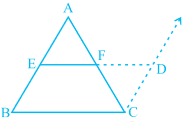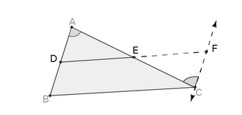मध्य-बिंदु प्रमेय: Difference between revisions
(added content) |
|||
| Line 17: | Line 17: | ||
== मध्यबिंदु प्रमेय का व्युत्क्रम == | == मध्यबिंदु प्रमेय का व्युत्क्रम == | ||
== Converse of Midpoint Theorem == | |||
'''Statement:''' The converse of midpoint theorem states that "the line drawn through the midpoint of one side of a triangle that is parallel to another side will bisect the third side". We prove the converse of mid point theorem by contradiction. | |||
=== Proof of Mid Point Theorem Converse === | |||
Consider a triangle <math>ABC</math>, and let <math>D</math> be the midpoint of <math>AB</math>. A line through <math>D</math> parallel to <math>BC</math> meets <math>BC</math> at <math>E</math>, as shown in the Fig. 2 below:. | |||
[[File:Midpoint theorem - converse.jpg|alt=Fig. 2|thumb|Fig. 2|none]] | |||
'''Given:''' In <math>\triangle ABC</math>, <math>D</math> is the midpoint of <math>AB</math> and <math>DE \parallel BC</math>. | |||
'''To Prove:''' <math>E</math> is the midpoint of <math>AC</math> (i.e.,<math>AE=CE</math>) | |||
'''Construction:''' Through <math>C</math>, draw a line parallel to <math>AB</math> that meets the extended <math>DE</math> at <math>F</math> | |||
{| class="wikitable" | |||
! colspan="2" |Proof of Converse of Midpoint Theorem | |||
|- | |||
|1. <math>BCFD</math> is a parallelogram | |||
|<math>DE \parallel BC</math> (given) and <math>BD \parallel CF</math> (by construction) | |||
|- | |||
|2. <math>BD =CF</math> | |||
|Opposite sides of a parallelogram are equal | |||
|- | |||
|3.<math>AD=BD</math> | |||
|D is the midpoint of AB (given) | |||
|- | |||
|4. <math>AD=CF</math> | |||
|from 2 and 3 | |||
|- | |||
|Compare <math>\triangle AED</math> with <math>\triangle CEF</math>: | |||
| | |||
|- | |||
|5. <math>\angle DAE=\angle ECF</math> | |||
|Alternative angles | |||
|- | |||
|6. <math>\angle DEA=\angle FEC</math> | |||
|Vertically opposite angles | |||
|- | |||
|7.<math>\triangle AED \cong \triangle CEF</math> | |||
|By AAS criterion (using 4, 5, and 6) | |||
|- | |||
|8. <math>AE=CE</math> | |||
|By CPCTC | |||
|} | |||
This completes the proof of the converse midpoint theorem. | |||
[[Category:चतुर्भुज]][[Category:कक्षा-9]][[Category:गणित]] | [[Category:चतुर्भुज]][[Category:कक्षा-9]][[Category:गणित]] | ||
Revision as of 13:26, 1 November 2024
ज्यामिति के क्षेत्र में त्रिभुजों के गुणों से संबंधित महत्वपूर्ण प्रमेयों में से एक को मध्य-बिंदु प्रमेय कहा जाता है।
मध्य-बिंदु प्रमेय के सिद्धांत का उपयोग निर्देशांक ज्यामिति में किया जाता है, जिसमें कहा गया है कि रेखाखंड का मध्यबिंदु अंत बिंदुओं का औसत होता है। इस प्रमेय का उपयोग करके समीकरण को हल करने के लिए 'x' और 'y' निर्देशांक ज्ञात होना चाहिए। मध्य-बिंदु प्रमेय कलन और बीजगणित के क्षेत्र में भी उपयोगी है।
मध्य-बिंदु प्रमेय कथन
मध्यबिंदु प्रमेय कहता है कि "किसी त्रिभुज में उसकी किन्हीं दो भुजाओं के मध्यबिंदु को मिलाने वाला रेखाखंड उसकी तीसरी भुजा के समांतर कहलाता है और तीसरी भुजा की लंबाई का आधा भी होता है।"
चित्र-1 में दर्शाए गए त्रिभुज में और त्रिभुज की दो भुजाओं के मध्यबिंदु हैं
, and
इसके साथ, हम निम्नलिखित प्रमेयों पर पहुँचते हैं
प्रमेय 1: त्रिभुज की दो भुजाओं के मध्य-बिंदुओं को मिलाने वाला रेखाखंड तीसरी भुजा के समांतर होता है।
प्रमेय 2: त्रिभुज की एक भुजा के मध्य-बिंदु से होकर दूसरी भुजा के समांतर खींची गई रेखा तीसरी भुजा को समद्विभाजित करती है।
मध्यबिंदु प्रमेय का व्युत्क्रम
Converse of Midpoint Theorem
Statement: The converse of midpoint theorem states that "the line drawn through the midpoint of one side of a triangle that is parallel to another side will bisect the third side". We prove the converse of mid point theorem by contradiction.
Proof of Mid Point Theorem Converse
Consider a triangle , and let be the midpoint of . A line through parallel to meets at , as shown in the Fig. 2 below:.
Given: In , is the midpoint of and .
To Prove: is the midpoint of (i.e.,)
Construction: Through , draw a line parallel to that meets the extended at
| Proof of Converse of Midpoint Theorem | |
|---|---|
| 1. is a parallelogram | (given) and (by construction) |
| 2. | Opposite sides of a parallelogram are equal |
| 3. | D is the midpoint of AB (given) |
| 4. | from 2 and 3 |
| Compare with : | |
| 5. | Alternative angles |
| 6. | Vertically opposite angles |
| 7. | By AAS criterion (using 4, 5, and 6) |
| 8. | By CPCTC |
This completes the proof of the converse midpoint theorem.

